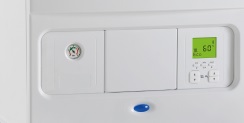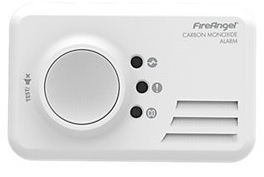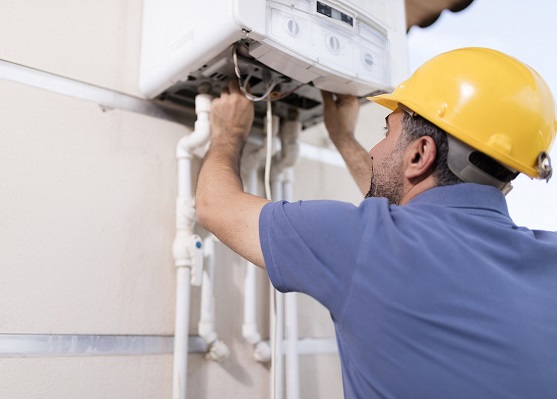Boiler Maintenance Advice
Reading time: 6 minutes
1. Boiler service
So, how often should a boiler be serviced? Much the same as booking your car in for its yearly MOT, booking your boiler in for a service once a year, with a Gas Safe registered engineer, will ensure all parts are working correctly. Not only will you be confident that your boiler is functioning efficiently, there’s the added benefit of catching any issues before real problems occur - which could result in a breakdown. Regular servicing will help maximise your boilers lifespan and help reduce your energy bills too.
-
Tip: if your boiler is under warranty, a yearly service will ensure it remains valid.
And if you’re a landlord, the law requires you to have annual gas safety checks on all gas-powered appliances - including gas boilers.
2. The heat is on
Although your boiler will be in use for hot water, it’s recommended that you occasionally turn on your heating for around 10 minutes - just to make sure that the boiler is working and to keep it operating.
3. Bleed your radiators
Bleeding your radiators will make sure your rooms are heated effectively - you don’t want to keep turning up the thermostat to heat up that one cold radiator when all the others are piping hot! Go around each radiator checking that they are warm from top to bottom - if they are cold at the top, this could mean there is an air pocket. By bleeding your radiators you can release any trapped air and you’ll soon have a fully functioning radiator.
-
Tip: before you bleed your radiators, be prepared! You will need a towel or cloth to protect your floor and wall against any water spray, as well as a bowl to catch the drips. And don’t forget to turn off your heating and let the radiators cool down before you start.
 4. The pressure’s on
4. The pressure’s on
Bleeding your radiators may result in a loss of pressure to your boiler. You should check your boiler’s pressure gauge and re-pressurise to your manufacturer’s instructions if needed. Re-pressurising your boiler is a fairly straightforward exercise, which should only take a few minutes for you to do yourself - the manufacturer's manual will help you, usually with a step-by-step guide. If in doubt, call a plumber.
5. Boiler flame
The flame in your boiler should be blue. If the flame is a yellow or orange colour you could have a problem, such as a carbon monoxide leak - call a Gas Safe engineer as soon as possible to check it out.
6. Lagging your pipes
Condensate pipes that lead to your combi boiler can freeze when the temperature is below zero - this will stop your boiler from firing up. So it could be a worthwhile investment, and relatively inexpensive, to lag your pipes. The condensate pipe, identified as the only plastic pipe to run from your boiler, usually runs through your cavity wall and allows for water condensation to drain away from your heating system - this may appear internally or externally.
-
Tip: an indication that your condensate pipe is frozen will be that you have no hot water or heating. Check the control panel of your boiler to see if there’s an error message displayed - usually in the form of a code e.g. F4, which will be explained in the user manual. Once you’ve inspected the pipe to confirm a blockage, you can pour warm or hot, not boiling!, water over the pipe to melt the ice. You should not cut or remove this pipe yourself, only a registered engineer can do this as it is part of the boiler flue system.
7. Carbon monoxide safety 
Carbon monoxide is a dangerous gas that you cannot see or taste, and it has no smell so physical detection is virtually impossible - that’s where a carbon monoxide alarm comes in, as well as a regular boiler service. Place your carbon monoxide alarm within close proximity to your boiler and test as often as indicated by the instructions - this will give you and your family peace of mind.
8. Keeping the balance
If your heating system is unbalanced then your boiler could be working harder than it needs to, causing an increase in your energy bills. This is most likely to occur in radiators that are further away from your boiler.
A sign that your system is unbalanced is some radiators will heat faster than others, or it could be that some radiators feel cooler in certain parts of your home e.g. it’s warmer upstairs than downstairs.
-
Tip: to check if your radiators are balanced, turn off your heating, set your Thermostatic Radiator Valves (TRV) to zero, and let the system cool for at least two hours.
Once cooled, start with the radiator furthest away from your boiler or heat pump, and turn the TRVs to number two. When you’ve gone around all radiators you can start to check the temperature of each, again starting from the furthest. If your radiators feel to be differing temperatures and heating, they are most likely unbalanced.
Re-balancing your radiators is a little more tricky than bleeding them, so a professional might be your best bet in getting the job done quicker, and save your sanity!
9. Stay ventilated
Your boiler needs an amount of ventilation so it can work properly. If you keep it in a cupboard, make sure that there is clear space all around the boiler and flue pipe so it is easily accessible for servicing and maintenance.
10. Check the signs
Check your boiler regularly for any warning signs that there may be a problem. Some signs might be: strange noises, such as clunking or gurgling, water leaking, or cracks - if any of these signs are present it’s a good idea to call in the professionals to take a look.
-
Tip: check the external flue or vent for blockages or debris - keeping these clear will help prevent potential issues.
Should I replace a 20 year old boiler?
The standard advice in the industry is to have your boiler replaced around every 10 years, but if it’s working perfectly well why should you need to pay out for a new one?
If your boiler has a regular service then it’s quite likely it will serve you for longer than 10 years, but if you do have an older model it might be worth thinking about.
Modern boilers have more of the necessary equipment built in, so no need for a hot water cylinder, zone valves, a heat pump and the like. Whilst an older boiler may be working well, its energy efficiency is more than likely to be outdated, so is probably costing you more in energy bills than a modern version.
We hope you have learnt a bit more about your boiler, and the importance of keeping it in tip top condition, so it will see you through many cold months.
You can browse our wide range of boilers from top brands: Worcester, Vaillant, Ideal and Baxi. And, don’t forget your boiler controls and accessories to keep your home or office comfortable and warm this winter.
Disclaimer: The information contained on this page is intended as an overall introduction and is not intended as specific advice from a qualified professional. Travis Perkins aims to avoid, but accepts no liability, in the case that any information stated is out of date.





